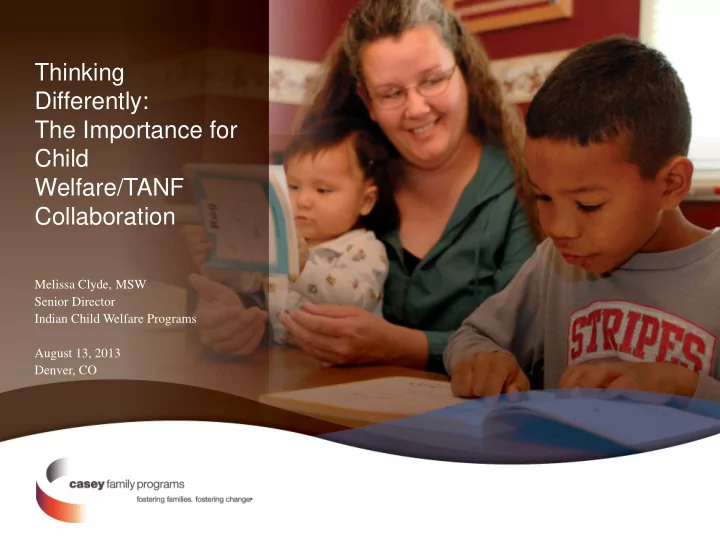

Thinking Differently: The Importance for Child Welfare/TANF Collaboration Melissa Clyde, MSW Senior Director Indian Child Welfare Programs August 13, 2013 Denver, CO
Remember why we are here today “Let us put our minds together and see what life we can make for our children.” -Sitting Bull Hunkpapa Lakota, 1877
Overview of Casey Family Programs Mission : Casey exists to provide and improve – and ultimately to prevent the need for – foster care. Goals : Casey aspires to fulfill its Mission by achieving the following long term goals: • Permanence We create security for children and youth by finding them safe, loving homes and by encouraging lasting connections to their family, friends, and community. • Transition We prepare youth to successfully make the transition from foster care to independent living. • Prevention We work with parents to strengthen families and prevent the need for foster care. • Disproportionality We promote parity in opportunities and outcomes for children of color, who enter the child welfare system in disproportionately high numbers, receive fewer services, and leave less prepared for adulthood. • Indian child welfare We support American Indian and Alaska Native tribes working to develop and improve their own sustainable child-welfare systems.
Overview of Casey Family Programs 2013 Organizational Objectives • Demonstrating direct service and ICW improvement models. - Influence jurisdictions to ICWA compliance, and to measure improved outcomes for Indian and families, as evidenced by: - Increasing use of the QUICWA tool and other compliance tools by tribes, jurisdictions and other entities to increase compliance. - Documenting measurable improvements in the well-being of American Indian/Alaskan Native children as measured by widely accepted well-being measures such as reduction in suicide rates and increase in high school graduation rates.
Overview of Casey Family Programs Cont’d 2013 Organizational Objectives • Support Tribal IV-E grantees to demonstrate effective practice models for tribes by increasing the numbers of tribes accessing direct IV-E funding by supporting the development of tribal-state agreements and access to IV-E waivers. • Changing the national conversation around building Communities of Hope. - Assist executive branch/tribal leaders, or their designees, to engage local stakeholders around Building Communities of Hope via jurisdiction, foundation, business and other community forces.
Indian Child Welfare Programs 2013 ICWP PRIORITY STATES 2014 ICWP Non-Priority States • Alaska • Colorado • Arizona • Idaho-- (2014) • Michigan • Maine • Minnesota • Montana • New Mexico • North Dakota • Oklahoma • Oregon • South Dakota • Washington ** National Projects
ME N H VT MN NY MA SD WI MI RI WY PA IA NV NE CT NJ OH IN CA IL UT DE WV VA MO KS KY MD NC DC OK TN AR SC GA AL MS AK TX LA HI FL PR NP= Non-Priority 7
Why is there is a need to collaborate? • Think about how you get business done for a ceremony, family gathering, birthday party. Everyone plays important role/responsibility. • Working together makes the job easier. • Child welfare is complex. Keeping children safe will require “all hands on deck.” • Everyone in the community wants children to be safe.
Why is there is a need to collaborate? • A TANF worker is often the first point of contact with high-risk families. • Parents/guardians/custodians may share more information with a TANF worker than with a child welfare worker. • Maximize resources/funding during a time of significant federal budget cuts. • Tribes have to become creative with resources/funding– conduct service delivery scans.
Why is there is a need to collaborate? • Tribes are leaders in developing prevention services. • TANF is temporary. Title IV-E is sustainable. Need to collaborate with child welfare to build infrastructures to improve service delivery. (Ex: $150-$250/month via TANF vs. IV-E eligible child)
Collaboration Child Courts Welfare TANF Spiritual/ Religious Grand- parents Community Cousins Aunt Resources Education High Risk Child & Other Family Tribal Uncle Behavioral IHS members Health Extended Clans Relatives Leadership
Contact Information Melissa Clyde, MSW Senior Director Indian Child Welfare Programs Casey Family Programs Email: MClyde@casey.org Phone: 720-479-0930
Recommend
More recommend